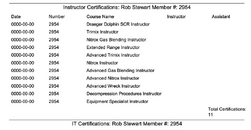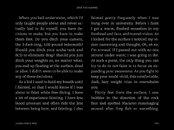I was really looking forward to trying this case. A ton of new evidence was disclosed in the the second half of 2023 that made things very interesting and awkward for many parties.
Among other things, the Medical Examiner failed to adequately consider Rob Stewart's medical history case. Here is an excerpt from Stewart's 2012 book, "Save the Humans," in which he discusses his lifelong history of low blood pressure and how he "often ride the line between being here, and fainting." Stewart did not disclose his low blood pressure on any of the three medical forms he filled out for his rebreather instruction courses or on the liability waiver he filled out before his final dives. Similarly, he failed to disclose that he was taking a daily prescription medication, the side effects of which include "dizziness, weakness, feeling like you might pass out."
Also, Stewart never obtained a comprehensive occupational diver’s medical fitness examination conducted by a physician knowledgeable and competent in diving medicine, which was required by Canadian law for commercial underwater filmmaking. This was likely because he was medically disqualified from occupational diving due to his low blood pressure. One of the many lessons to be learned from this incident is to be honest about your medical condition and know what could happen when you venture underwater.
He also failed to obtain a permit to film in a National Marine Sanctuary, which would have required him to file his dive plans, team qualifications and Occupational Diver's Certificate of Medical Fitness issued by the Diver Certification Board of Canada (which his employer, Sharkwater Productions, was legally required to keep in its files but could not seem to locate during discovery). Ironically, there were internal emails between members of the production team asking if Horizon Divers was willing to undertake the charter even though the film crew did not have the necessary permits (which would never have been issued by NOAA to film an endangered species like the sawfish).
Sadly, the effects of this loss are all too common: family and friends are still grieving, multiple parties endured several years of expensive litigation, and no final conclusion about what actually happened was ever achieved.






